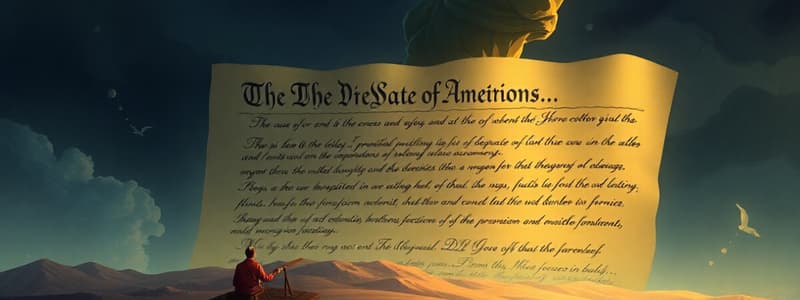Podcast
Questions and Answers
Which amendment abolished slavery?
Which amendment abolished slavery?
- Fifteenth Amendment
- Thirteenth Amendment (correct)
- Fourteenth Amendment
- Twelfth Amendment
What does the Sixth Amendment guarantee?
What does the Sixth Amendment guarantee?
- The right to vote
- The right to a speedy and public trial (correct)
- The right to bear arms
- The right to remain silent
Which amendment changed the process for electing the President and Vice President?
Which amendment changed the process for electing the President and Vice President?
- Twenty-Second Amendment
- Eleventh Amendment
- Twelfth Amendment (correct)
- Seventeenth Amendment
What does the Ninth Amendment state?
What does the Ninth Amendment state?
Which amendment granted citizenship to all people born in the U.S.?
Which amendment granted citizenship to all people born in the U.S.?
What did the Eighteenth Amendment do?
What did the Eighteenth Amendment do?
Which amendment addresses presidential succession?
Which amendment addresses presidential succession?
Which amendment prohibits poll taxes as a requirement to vote?
Which amendment prohibits poll taxes as a requirement to vote?
What does the Tenth Amendment state about powers not given to the federal government?
What does the Tenth Amendment state about powers not given to the federal government?
What significant voting rights change was made by the Nineteenth Amendment?
What significant voting rights change was made by the Nineteenth Amendment?
Which of the following statements accurately reflects the purpose of the Preamble to the U.S. Constitution?
Which of the following statements accurately reflects the purpose of the Preamble to the U.S. Constitution?
Which branch of the government is responsible for interpreting laws?
Which branch of the government is responsible for interpreting laws?
What major issue was resolved by the Great Compromise?
What major issue was resolved by the Great Compromise?
What is the main reason the Articles of Confederation were replaced by the Constitution?
What is the main reason the Articles of Confederation were replaced by the Constitution?
Which of the following is NOT a key principle of the U.S. Constitution?
Which of the following is NOT a key principle of the U.S. Constitution?
Flashcards
Second Amendment
Second Amendment
Protects the right to bear arms.
Third Amendment
Third Amendment
Prevents government from quartering soldiers in homes.
Fourth Amendment
Fourth Amendment
Protects against unreasonable searches and seizures.
Fifth Amendment
Fifth Amendment
Signup and view all the flashcards
Sixth Amendment
Sixth Amendment
Signup and view all the flashcards
Eighth Amendment
Eighth Amendment
Signup and view all the flashcards
Ninth Amendment
Ninth Amendment
Signup and view all the flashcards
Thirteenth Amendment
Thirteenth Amendment
Signup and view all the flashcards
Nineteenth Amendment
Nineteenth Amendment
Signup and view all the flashcards
Twenty-Fifth Amendment
Twenty-Fifth Amendment
Signup and view all the flashcards
Articles of Confederation
Articles of Confederation
Signup and view all the flashcards
Preamble of the Constitution
Preamble of the Constitution
Signup and view all the flashcards
Three branches of government
Three branches of government
Signup and view all the flashcards
Legislative Branch
Legislative Branch
Signup and view all the flashcards
Great Compromise
Great Compromise
Signup and view all the flashcards
Study Notes
US Constitutional Amendments Summary
- Second Amendment: Protects the right to bear arms.
- Third Amendment: Prevents the government from forcing people to quarter soldiers.
- Fourth Amendment: Protects against unreasonable searches and seizures.
- Fifth Amendment: Guarantees the right to remain silent, protects against double jeopardy, and ensures due process.
- Sixth Amendment: Guarantees the right to a speedy and public trial.
- Seventh Amendment: Grants the right to a trial by jury in certain civil cases.
- Eighth Amendment: Protects against cruel and unusual punishment.
- Ninth Amendment: States that people have rights beyond those listed in the Constitution.
- Tenth Amendment: Says that powers not given to the federal government belong to the states or the people.
- Eleventh Amendment: Limits lawsuits against states.
- Twelfth Amendment: Changed the presidential election process for clarity.
- Thirteenth Amendment: Abolished slavery.
- Fourteenth Amendment: Granted citizenship to all born in the U.S. and guaranteed equal protection under the law.
- Fifteenth Amendment: Gave African American men the right to vote, regardless of race.
- Sixteenth Amendment: Allowed Congress to collect income taxes.
- Seventeenth Amendment: Allowed for the direct election of Senators.
- Eighteenth Amendment: Banned alcohol (Prohibition).
- Nineteenth Amendment: Granted women the right to vote.
- Twentieth Amendment: Changed the start date of the President's term to January 20th.
- Twenty-First Amendment: Repealed the Eighteenth Amendment (ending Prohibition).
- Twenty-Second Amendment: Limited the President to two terms.
- Twenty-Third Amendment: Gave Washington, D.C. electoral votes.
- Twenty-Fourth Amendment: Banned poll taxes as voting requirements.
- Twenty-Fifth Amendment: Explains presidential succession.
- Twenty-Sixth Amendment: Lowered the voting age to 18.
- Twenty-Seventh Amendment: Prevents Congress from giving itself a pay raise until after the next election.
Structure of the US Government
- The Articles of Confederation were too weak, leading to the Constitution.
- The Preamble states the goals of the Constitution.
- "We the People" are the first three words of the Preamble.
- The US government has three branches: Legislative, Executive, and Judicial.
- The Legislative Branch creates laws and is led by Congress.
- The Executive Branch enforces laws and is led by the President.
- The Judicial Branch interprets laws and is led by the Supreme Court.
- The Great Compromise created a two-house Congress: The House of Representatives (based on population) and the Senate (equal representation for each state).
Studying That Suits You
Use AI to generate personalized quizzes and flashcards to suit your learning preferences.




